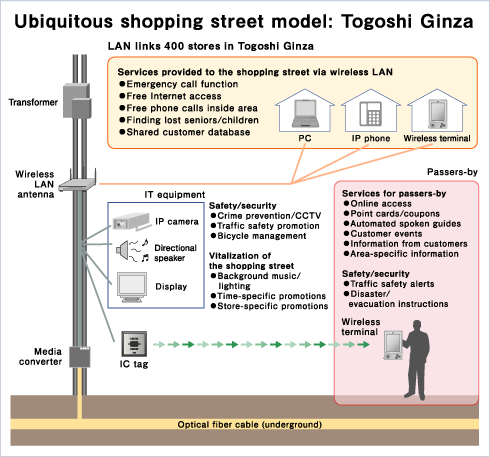

In 2003, Meiji University established the Intellectual Property Headquarters for the Promotion of Social Collaboration to help capitalize on the fruits of the university’s research for the benefit of industry and the local community. As part of this initiative, the university also created a business incubation center to support the growth of start-up enterprises emerging from joint research programs with private-sector companies. The overall goal is to encourage the evolution of new industries.
The university is also conducting research activities that have direct economic links with local communities. One example is the Ubiquitous Shopping District Project, which started in 2006 and is sponsored by the Ministry of Education, Culture, Sports, Science and Technology as a part of the Social Collaboration Project.
A shopping street with advanced IT
The goal of the Ubiquitous Shopping District Project is to employ IT network infrastructure to create a safe next-generation shopping area that is attractive to shoppers. Other aims include reinvigorating the local economy and fostering young entrepreneurs.Working in conjunction with underground cabling operations in Tokyo’s Shinagawa Ward, the project involves installing wireless LAN antennas in streetlights within a local shopping district, along with video cameras, displays and other equipment. The system distributes content such as information about the shopping district, along with other services. The Togoshi Ginza shopping district in Shinagawa Ward, a street roughly 1.6km long containing some 400 stores, has been chosen as the pilot location.
The content service provider for the project is COCO WA DOCO, a venture company set up inside Meiji University. Its president is Meiji alumnus Masahiro Handa, who was born and raised in Togoshi.
Mr. Handa explains: “As part of the project, we have been holding IT classes over the past three years to help local residents become familiar with computers. We have assigned an ID and password to each store in the district, while also converting store websites into formats that can easily be updated using a mobile phone. Since everything has been developed based on the Oh-o! Meiji System, the project leverages the results of research done at Meiji University.”
The Oh-o! Meiji System is a campus web portal developed by a team led by Professor Shinji Anzo of the School of Political Science and Economics, whose specialty is demography. The web portal, established in 2003, currently provides online services to 2,000 academic staff and 30,000 students at Meiji University. Campus-based users and the general public can obtain a wealth of information related to academic courses using this system.
Improvement of the infrastructure of the shopping street goes beyond IT
Special touch-screen display panels have been installed at four locations in the Togoshi Ginza shopping street. Shoppers can use these terminals to find out more about the services offered at each store in the area, or to search for products even if they do not have a mobile phone or a computer.The specially installed infrastructure at Togoshi Ginza is not limited to IT equipment. Togoshi Ginza is located in a basin surrounded by higher ground, which tends to trap heat. High temperature and humidity in the summer are considered to negatively affect purchasing behavior, particularly that of seniors. In collaboration with the Tokyo Metropolitan Government Environment Bureau, a dry mist diffuser is installed at Togoshi Ginza to provide relief to people walking along the street during hot and humid weather over the summer months.
Such initiatives reveal the project’s objective of positive engagement with the community. The project-related media coverage has helped to invigorate the local economy, thus advancing one of the goals of the project.
Development of a mobile phone that makes recommendations based on the user’s behavior
The Ubiquitous Shopping District Project is not just trying to make a specific shopping area more dynamic. It is also involved in evaluation work contracted by mobile carrier NTT DoCoMo.This aspect of the project is based on METI’s Information Grand Voyage project that involves testing GPS mobile phone-based services that reflect the analysis of consumer behavior. The METI project employs 60 research staff, including lecturer Kenji Kamada from the university’s School of Political Science and Economics. He sums up the challenge of the project as “developing a mobile phone that knows what’s happening with the user.”
NTT DoCoMo already offers a service called iConcierge that provides locally tailored lifestyle information to mobile handsets. Based on GPS data, the handset displays a map of the local area and helps the user search for nearby shops or other features.
The mobile phone that knows what’s happening with the user takes this concept a step further by analyzing the behavioral history and characteristics of people to provide them with appropriate lifestyle-related information based on predictive software. For instance, it might suggest a restaurant based on the user’s profile. GPS data can then be used to confirm whether the user acts on the recommendation.
“When somebody chooses a store that they would not normally use, we refer to the attraction as a ‘behavioral inducement.’ Meiji University has developed a way of indicating whether the user can make good use of the information provided by the mobile phone. NTT DoCoMo picked up on that,” explains Mr. Kamada.
The METI Information Grand Voyage project is built around a search engine developed in Japan. While it is no longer possible to compete with Google on keyword searches, a search engine that could generate relevant suggestions based on positional information would be a potential world-beater.
“You can find neighborhood maps and satellite images quite easily on Google,” says Professor Anzo, “but the people who live in these neighborhoods are all different. We think there is room to provide services that are specifically tailored to users based on location.”
Target areas for such services would include districts with many resident seniors, who are fairly affluent but are less mobile, as well as areas with higher numbers of young people or households with two incomes and young children. This information can be interpreted from census data on the distribution by industrial sector of workers in households.
Although marketers already make use of census-based data to target consumers, nobody has yet added information about area of residence and lifestyle attributes to positional GPS data to generate behavioral predictions as the basis for marketing activities.
The Ubiquitous Shopping District Project links marketing with demographics, which is Professor Anzo’s specialty. By combining such knowledge with positional data, the team from Meiji University aims to create an original business model.
The professor argues that demography underpins many of the concepts that support social cooperation. Making a social contribution often involves addressing needs that are dispersed in society. By analyzing data, creating hypotheses and generating the numbers to prove these theories, the Ubiquitous Shopping District Project is research with the potential to deepen social collaboration.

Profile
Professor, Shinji Anzo, Department of Economics, School of Political Science and Economics, specializing in demography, sociology including the sociology of welfareBorn in Tokyo in 1953. Completed the Master’s course in Department of Economics, School of Political Science and Economics, Meiji University. Conferred a Master of Art degree in sociology, a Master of Science (applied demography) and a Doctor of Philosophy in Sociology by Graduate School, University of Southern California.










